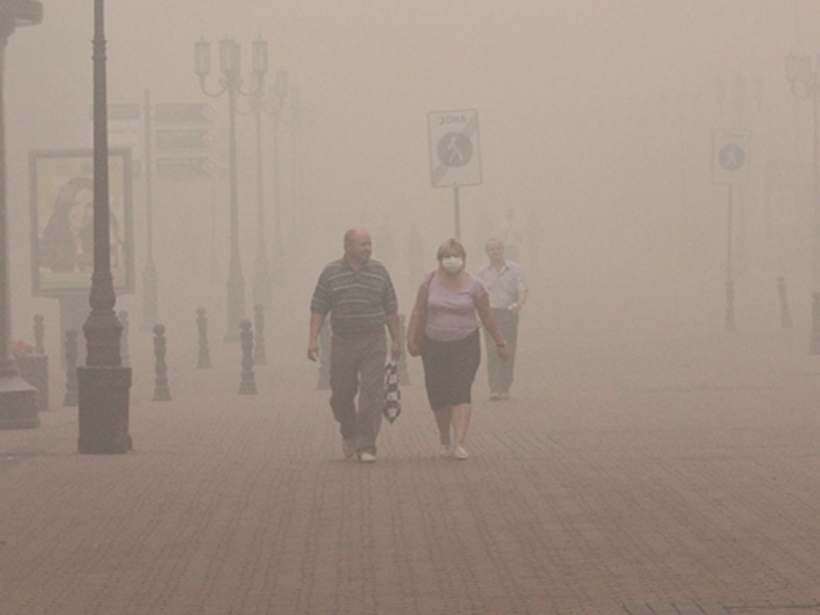The links between air quality and cardio-pulmonary disease have been well-documented. The COVID-19 pandemic revealed that long-term air pollution exposure also causes inflammatory responses in the lungs that can lead to the most severe cases of COVID disease. But even before COVID, approximately 7 million people died from air pollution every year and it takes years off the human lifespan in countries such as Pakistan with consistently poor air quality.
Climate change further worsens regional air pollution due to increased formation of fine particulate matter, ozone, and wildfire-related smoke, a trend that will likely continue for the foreseeable future.
Could some lung cancers be tied to air pollution?
The pulmonary diseases that are tied most commonly to air pollution are asthma, Chronic Obstructive Pulmonary Disease, pulmonary fibrosis, and hypertension. But could some lung cancers also be tied to air pollution?
Lung cancer is a tricky disease. Most people can find a story of the person who smokes two packs of cigarettes a day and lives into their nineties, or the converse story of a young person who dies of lung cancer, even though they never took a puff in their life. Those aberrations are largely driven by genes, but in general, smoking significantly increases lung cancer risk due to particulates and chemicals in the smoke. In a similar vein, particulates and chemicals from air pollution may also be expected to have some influence over populations that are burdened by air pollution, thus putting them at higher risk of lung cancer.
The links between air pollutants and lung cancer, and the disease mechanisms themselves, has been the topic of discussion in the literature for decades.
The links between air pollutants and lung cancer, and the disease mechanisms themselves, has been the topic of discussion in the literature for decades.
A research gauntlet of sorts was thrown down in 1995 by Aaron Cohen and Arden Pope, who argued that the links between these factors, largely explored through animal exposure models, may be significantly under-estimated the human health risks.
They called for better epidemiologic research to improve estimates of lung cancer risk from air pollution among the general population, including improved characterization of exposure to air pollutant mixtures, and better ecological studies of the population-wide exposure and disease response.
Since that time, air pollution has largely gone down in the developed world but has been replaced by a sharp uptick in air pollution in the developing world, where access to adequate epidemiologic and public health records might be limited.
Many ecological analyses (i.e., correlation analysis between air pollution values and population health, as opposed to individual health) have been conducted since that time, refining our general understanding of air pollutants and lung cancer risk. As with many other cardiopulmonary impacts of air pollution, most of the blame is now being placed on fine particulate matter less than 2.5 microns in aerodynamic diameter (PM2.5), which is largely the direct result of human activities. Other dangerous air pollutants, such as nitrogen oxides and ozone, seem to be less of a driver.
What will climate change bring to the mix?
Less research headway has been made into other issues, such as air pollution mixtures, co-morbidities, pulmonary reactions to air pollution, and genetic relationships. And of course, what will climate change bring to the mix?
This latter is critical, as many studies have revealed how climate change will affect regional, and global, air quality on many fronts. These newer findings could be folded into projections of changes in lung cancer risk, be it in particular regions or in relation to genetic preconditioning.
To explore these topics in more detail, and to provide a general roadmap to future research in this area, the journals GeoHealth and Cancer Medicine have opened a unique joint special collection entitled Exploring the Links Between Air Quality and Lung Cancer. We welcome submissions that detail current research, as well as Policy pieces and Commentaries that provide a broader perspective of research and funding needs to support further efforts. Manuscripts should be submitted through the electronic submission system for the relevant journal.
—Gabriel Filippelli, Editor-in-Chief, GeoHealth, and Center for Urban Health, Indiana University-Purdue University Indianapolis, USA ([email protected]; ![]() 0000-0003-3434-5982)
0000-0003-3434-5982)
Citation:
Filippelli, G. (2021), Does bad air cause lung cancer?, Eos, 102, https://doi.org/10.1029/2021EO159227. Published on 02 June 2021.
Text © 2021. The authors. CC BY-NC-ND 3.0
Except where otherwise noted, images are subject to copyright. Any reuse without express permission from the copyright owner is prohibited.

